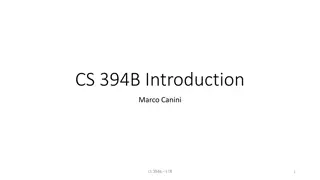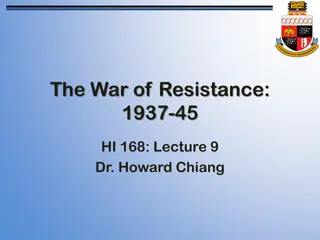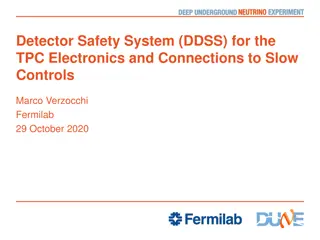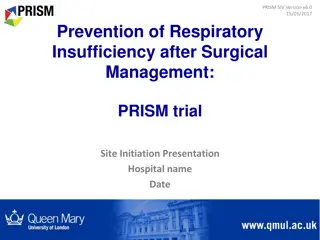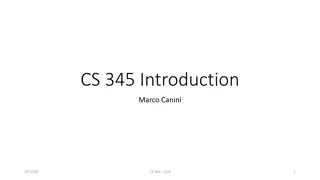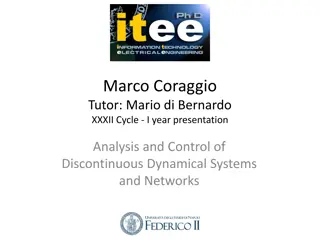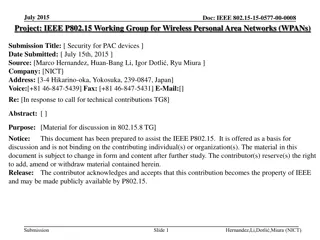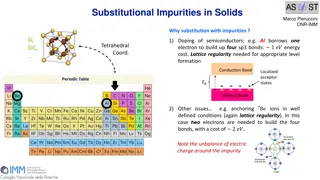
Dialectical Behavior Therapy Skills Training for Co-Occurring Alcohol Use and Personality Disorders
Explore the effectiveness of Dialectical Behavior Therapy Skills Training (DBT-ST) as a therapeutic alternative for individuals with comorbid alcohol use disorder (AUD) and personality disorders. The study compares treatment outcomes in AUD patients with and without personality disorders, focusing on abstinence maintenance and emotional dysregulation. Results indicate promising potential for DBT-ST in treating this complex comorbidity.
Download Presentation

Please find below an Image/Link to download the presentation.
The content on the website is provided AS IS for your information and personal use only. It may not be sold, licensed, or shared on other websites without obtaining consent from the author. If you encounter any issues during the download, it is possible that the publisher has removed the file from their server.
You are allowed to download the files provided on this website for personal or commercial use, subject to the condition that they are used lawfully. All files are the property of their respective owners.
The content on the website is provided AS IS for your information and personal use only. It may not be sold, licensed, or shared on other websites without obtaining consent from the author.
E N D
Presentation Transcript
IS DIALECTICAL BEHAVIOR THERAPY SKILLS TRAINING A THERAPEUTIC ALTERNATIVE IN ALCOHOL USE DISORDER AND PERSONALITY DISORDERS COMORBIDITY TREATMENT? Marco Cavicchioli (1-2), Mariagrazia Movalli (1-2), Pietro Ramella (1-2), Cesare Maffei (1-2) University Vita-Salute San Raffaele, Milan (2) Department of Clinical Psychology, San Raffaele Hospital, Milan (1)
THE PROBLEM OF PDS IN SUDS PDs in SUDs high co-occurrence, especially cluster B PDs (e.g. Grant et al., 2016) PDs showed high relapse rate during SUDs treatments (e.g. Bradizza et al., 2006) PDs were associated to increased drop-out from SUDs treatment (e.g. Brorson et al., 2013)
A POSSIBLE SOLUTION standard DBT and DBT-ST as stand-alone treatment effective treatment for BPD-SUDs (e.g. Linehan et al., 1999, 2002) feasible interventions in clinical populations characterized by emotional dysregulation (e.g. Valentine et al., 2015) promising results in treating AUD (Maffei et al., under revision)
THERE ARE NO STUDIES IN LITERATURE THAT EXPLORE POSSIBLE BENEFITS IN USING DBT-ST AS STAND-ALONE TREATMENT FOR COMORBIDITY BETWEEN AUD AND PDs
AIMS OF THE STUDY This study aims to: compare primary (i.e. attrition rate, abstinence maintenance, alcohol addiction severity) and secondary (i.e. emotional dysregulation) treatment outcomes during 3-month DBT-ST program in AUD patients with and without PDs evaluate the relationship between abstinence maintenance and emotional dysregulation change among both subgroups
SAMPLE AND CHARACTERISTICS OF INTERVENTION 216 AUD subjects consecutively admitted to DBT-ST program. 62.5 % met criteria for at least one PDs PD-NOS (24.5%), NPD (15.3%), BPD (8.8%) NPD and BPD traits were most recurrent 206 patients concluded the intensive phase (1 month; 5 times a week). 10 (4.6%) dropped out. 170 patients (78.7%) concluded the post-intensive phase (2 months; twice a week). 46 (21.3%) dropped out. During the program, there were random weekly toxicological screenings. 216 subjects analyzed (ITT analysis: LOCF). POST-INTENSIVEPHASE 8 WEEKS INTENSIVEPHASE 4 WEEKS 1 2 3 4 5 6 7 8 9 10 11 12 216 206 170 10 36
RESULTS: ATTRITION RATE 25 20 ATTRITION RATE (%) 15 AUD AUD +PDs 10 5 0 Fisher s exact test: 2(1) = .18, ns; ODD ratio = 1.16
RESULTS: ABSTINENCE MAINTENANCE 72.1% reached abstinence the mean of consecutive days of abstinence reached during the program was 82.98 (45.03) 14.3% lapsed during the intensive phase 13.6% lapsed during the post-intensive phase 140 35 120 30 CONSECUTIVE DAYS OF 100 25 ABSTINENCE LAPSE RATE (%) AUD 80 20 AUD+PDs 15 60 10 40 5 20 0 0 Fisher s exact test: 2(1) = .72, ns; ODD ratio= 1.28 t (214) = 1.36, ns; d (95% CI) = -.19 (-.47 - .08)
RESULTS: ALCOHOL ADDICTION SEVERITY 35 SPQ ALCOHOL SUBSCALE 30 25 MEAN 20 AUD 15 AUD+PDs 10 5 0 beginning of treatment end of treatment Note: controlling for baseline levels, we did not reveal significant changes during the treatment [F (1,214) = 1.20, ns; p 2= .006]
RESULTS: EMOTIONAL DYSREGULATION d (95% CI)= .62 (.33 - .90) 120 110 DERS TOTAL SCORE d (95% CI) = .53 (.25 - .81) 100 MEAN 90 AUD 80 AUD+PDs 70 60 50 beginning of treatment end of treatment Note: controlling for baseline levels, we observed a significant main effects of time [F (1,214) = 4.22, p < .001; p 2 = .18] and group [F (1,214) = 4.58, p < .05; p 2 = .02], as well as a significant interaction effect time x group [F (1,214) = 4.58, p < .05; p 2 = .02]
RESULTS: LAPSE AND EMOTIONAL DYSREGULATION 120 DERS TOTAL SCORE 110 100 MEAN AUD abstinent 90 AUD+PDs abstinent AUD lapsed 80 AUD+PDs lapsed 70 60 50 beginning of treatment end of treatment
DISCUSSION overall, we observed a low attrition rate if DBT-ST is compared to other SUDs treatment (Aharonovichet al., 2008; Deane et al., 2012; Santonja-G mez et al., 2010) AUD with and without PDs co-diagnoses showed same drop-out rate DBT dialectical and attachment strategies enhancemotivation, especially in PDs patients with SUDs (Bornovalovaet al., 2007) up to 70% of participants reached abstinence and there were no differences between AUD with and without PDs in abstinencemaintenance we revealed a large improvement in emotional dysregulation,which was relatedto abstinencemaintenance (Maffei et al., under revision) nevertheless, PDs patients showed higher levels of emotional dysregulation during the treatment and the relationship previously mentionedwas specific for this subgroup Emotional dysregulation remains the core vulnerability factor to relapse among PDs with SUDs.
LIMITATIONS AND FUTURE DIRECTIONS absence of a control condition our conclusions were based on post-hoc considerations no follow-up evaluations DBT-ST should be implemented with individual sessions in order to effectively reduce vulnerability factor to relapse among patients with PDs-SUDs.
THANK YOU FOR YOUR ATTENTION! Any questions?


